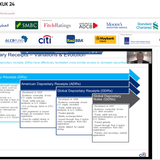Moody’s recently lowered its outlook on the Chilean banking sector from stable to negative, citing an expectation that profitability across the sector will contract.
Although credit growth across the sector has slowed substantially, there has been no noticeable rise in the number of non-performing loans, which currently stand at around 2% of total loans.
“Chile’s banking sector is relatively well placed. Banks are currently relatively well capitalised,” said Adam Collins, assistant economist at Capital Economics.
The financial sector in Chile is more developed than others in the region, so banks are more highly leveraged as a result.
This means that in comparison to other banking sectors across LatAm, the loan to deposit ratio in Chile looks weaker. However, as Collins noted, this is to be expected due to the seniority of the country’s finance sector.
Similarly to its banking sector, Chile’s economy stands out from many others across the region.
“There is still foreign investment flowing into the country for the most part. It is one of the more investible places in LatAm at the moment.”
However, despite economic growth picking up from around 1.5% after a sharp slowdown in 2013, growth has since remained around 2% for the past two to three years. Growth rose from 1.3% to 2% from Q1 to Q2 2016 according to data from Trading Economics. Potential growth is likely to be closer to 3.5% according to Collins.
“Slow growth is proving problematic. The government needs to reign in the public deficit, but the economy is not picking up.” Chile’s government deficit was equal to 2.20% of GDP in 2015.
Although the economy is unlikely to slow further, slow growth has led to pessimism in the markets surrounding Chile.
Adding to investor concerns, Chile is also showing some signs of reverting to populist measures. Recently-passed labour reforms that strengthen the power of unions and make it more difficult to replace striking workers have stoked national debate since the legislation was introduced in 2014, particularly among business leaders in the country. Edutation reforms have also prompted widespread protests among the country's youth.
Collins downplayed those concerns, adding that populism is largely on the decline in the country.
“There is no concern over populist policies being implemented in the near term, at least until the next presidential election in November 2017,” Collins said.









